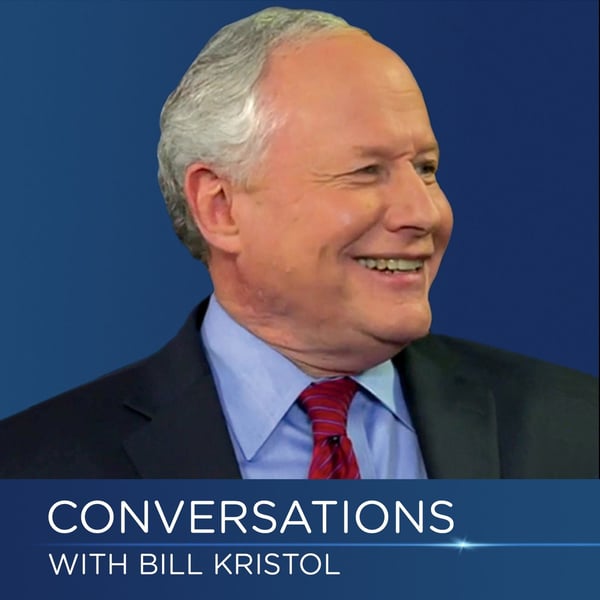David Epstein: The Political Ideas of The Federalist
Conversations with Bill Kristol
Conversations with Bill Kristol
4.7 • 1.7K Ratings
🗓️ 12 August 2021
⏱️ 78 minutes
🧾️ Download transcript
Summary
Transcript
Click on a timestamp to play from that location
| 0:00.0 | Hi, I'm Bill Crystal. Welcome to Conversations. I'm very pleased to be joined today by my old friend, David Epstein, and we're going to discuss the Federalist about which, an important book about which David wrote an important book. |
| 0:28.0 | I think the best book written on the Federalist, it came out almost, it was a dissertation. We were in classical together and it came out almost 40 years ago and stands up very well and is still in print. That's pretty amazing, David. That's itself a tribute, I'm sure. |
| 0:44.0 | I'm hoping this will spike sales. |
| 0:46.0 | Totally, so people need to order it. That's the first thing I need to say. This conversation does not replace your obligation to read the whole book and study the books called the Flinnical Theory of the Federalist published by the University of Chicago in 84. |
| 0:58.0 | David and I both got our PhDs from Harvard, both taught a little bit and left the academy. David went on to actual serious work in the defense department and did some good for the country and I went on to whatever. |
| 1:10.0 | But obviously David speaks today as an individual and now does not represent the U.S. government and all of its different |
| 1:17.0 | tributaries and whatever, right? |
| 1:21.0 | Right. |
| 1:22.0 | You're speaking as an individual. |
| 1:24.0 | So let's talk about the Federalist and maybe a little less on the political theory of the Federalist, which the book is really excellent on and more on political lessons from the Federalist. |
| 1:35.0 | I'm sure our viewers, of course, have read the Federalist and sure study this, but in case they haven't give a quick, quick reminder about the Federalist papers. |
| 1:46.0 | Okay. Thank you. It's great to be here. A big fan of the show. So it's a pleasure to join you. |
| 1:53.0 | You know, after the Philadelphia Convention of 1787, the Constitution as drafted was submitted for ratification by each state in popular conventions. |
| 2:03.0 | And as soon as it was released publicly after this secret meeting all summer, there began a big debate started out, I think, mostly by the opponents joined by the proponents. |
| 2:18.0 | And Alexander Hamilton thought the debate was a little bit crude and maybe not going quite his way. And he thought what was needed was a more comprehensive treatment that would defend the Constitution as a whole, not just attack individual anti Federalists for their their their criticisms. |
| 2:39.0 | So he recruited other people to help him. He planned out a long series of essays. The book is called the Federalist. It's a collection of 85 essays. I think it's probably better not to think of it as like op-ed columns that have been collected together after they were written more like say Dickens writing a novel and publishing pieces of it as he goes along. |
| 3:05.0 | Because in Federalist one Hamilton lays out this rather elaborate plan of what's going to be discussed and pretty much sticks to it. The co authors John Jay James Madison Hamilton had invited a couple of other people, one of whom said no, one of whom wrote something and then Hamilton. |
| 3:24.0 | I guess politely told him didn't quite meet Hamilton's needs. And in the musical version Hamilton invites Aaron Burr to help and Burr says no, which is apocryphal but correct and that Burr himself was ambivalent and kind of joined the pro constitution people rather relate. |
| 3:47.0 | So the project was to recommend this form of government to both the people who were electing delegates to these conventions, also to the delegates themselves, some of which were undecided or actually changed their minds and to contribute to to the debate. |
| 4:06.0 | So I think it's fine that it would last beyond perhaps the immediate moment right there's some indications of that and guide us in the future too. |
| 4:14.0 | Yes, I mean there's actually a passage I think where Hamilton says if certain political principles espoused by the had a Federalist became the political creed of the country, it would unfit us for any government whatsoever. |
| 4:32.0 | It makes you wonder what kind of political creed is necessary for the country, what kind of instruction the Federalist was trying to give us since I mean I think you know it's both an explanation of the institutions, which say have a kind of life of their own, but also an attempt to educate and instruct the people who will obviously have some say over how the institutions develop. |
... |
Please login to see the full transcript.
Disclaimer: The podcast and artwork embedded on this page are from Conversations with Bill Kristol, and are the property of its owner and not affiliated with or endorsed by Tapesearch.
Generated transcripts are the property of Conversations with Bill Kristol and are distributed freely under the Fair Use doctrine. Transcripts generated by Tapesearch are not guaranteed to be accurate.
Copyright © Tapesearch 2025.

